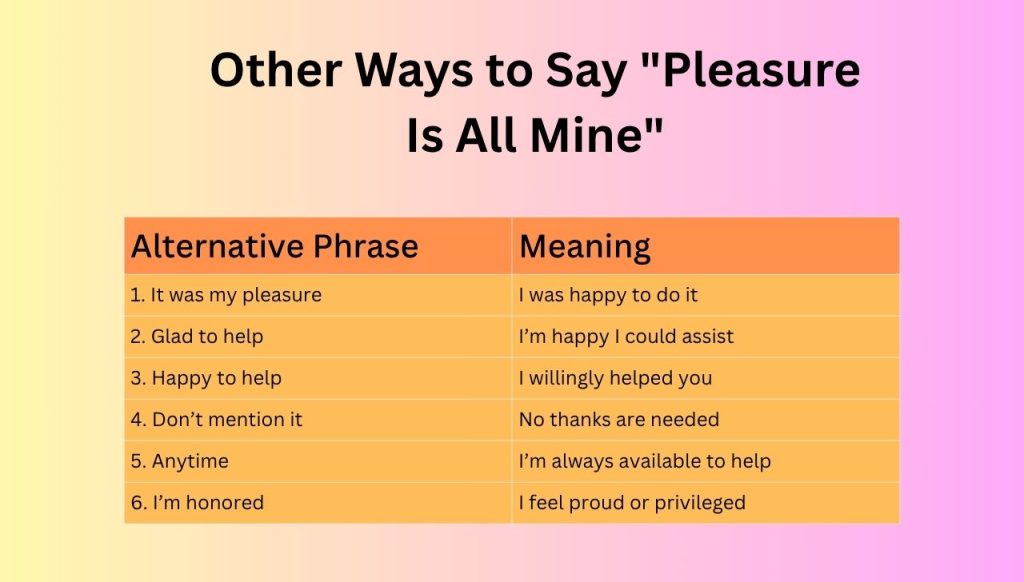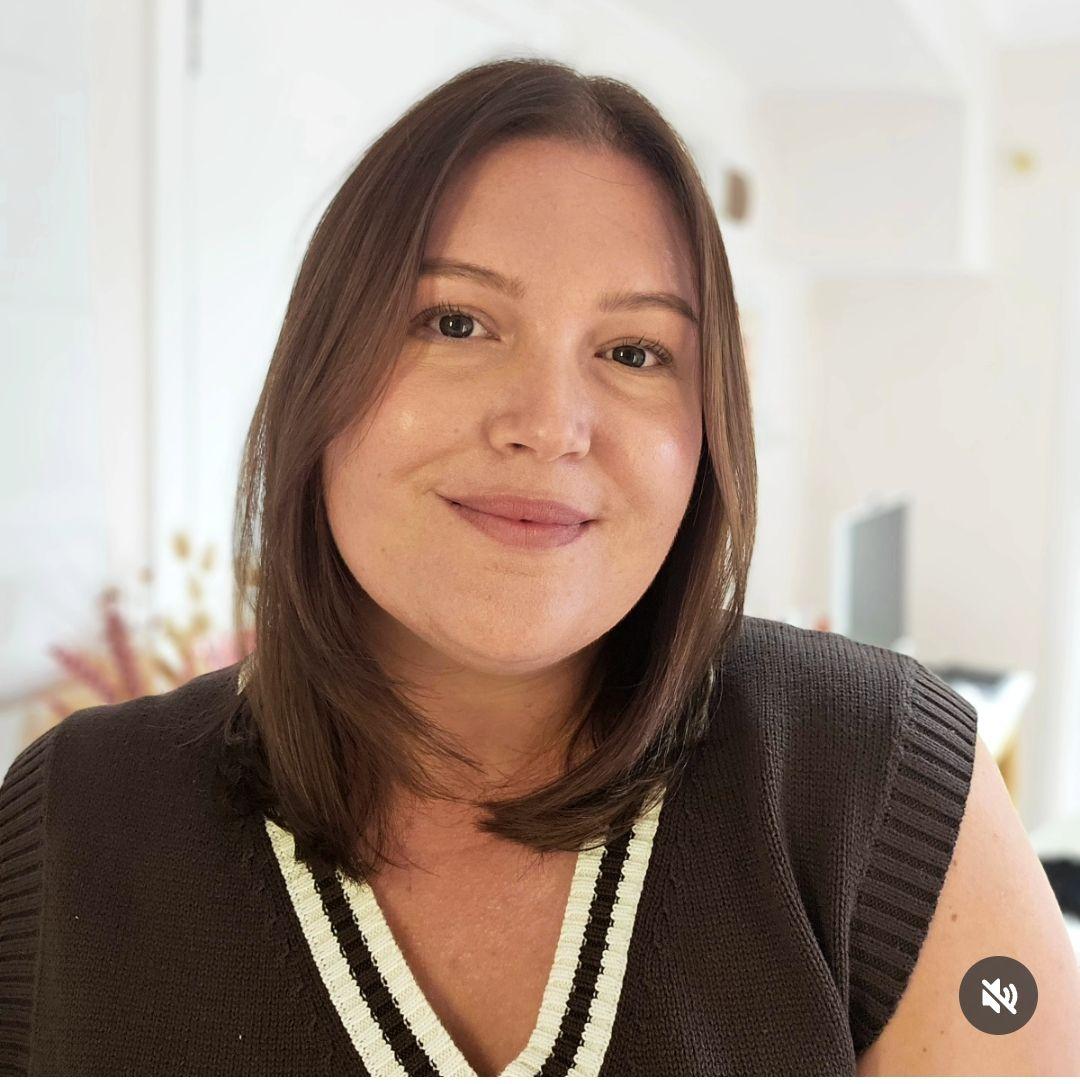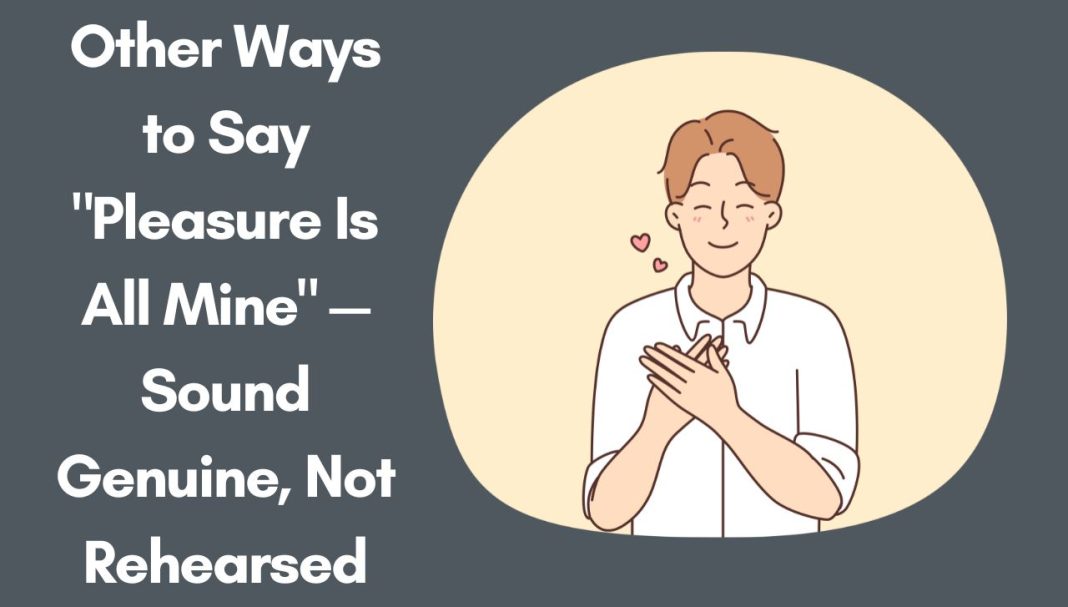Let’s be honest—sometimes, politeness starts to sound a little… rehearsed. You’ve just met someone, they say, “It was a pleasure meeting you,” and without thinking, you shoot back, “The pleasure is all mine.” It’s courteous, sure. Classic, even. But after a while, it starts to feel like that one pair of shoes you wear to every formal event: reliable but not exciting.
So what if you could switch it up a bit? Maybe sound more genuine, or just more like you? That’s what this article is all about—fresh, meaningful, and sometimes even playful ways to say “Pleasure is all mine.”
But before we start rewriting your social scripts, let’s take a step back and understand where that phrase comes from and when it’s actually appropriate.
“Pleasure Is All Mine” — Meaning
On the surface, “The pleasure is all mine” is a humble way to accept thanks or acknowledgment. It’s your way of saying, “I’m flattered you enjoyed our interaction—but honestly, I got just as much (if not more) out of it.”
Think of it as the social equivalent of a bow and a smile—it gives credit to the other person, while still acknowledging your own happiness or satisfaction. It’s polite. It’s respectful. And yep, it’s a bit formal.
This phrase tends to carry a slight touch of formality or even elegance. It’s the kind of thing you’d hear in an interview, a networking event, or when meeting someone respected. It’s not the same tone you’d take with your best friend after handing them a soda. That said, the intention behind it—expressing genuine appreciation for a moment or meeting—is something we can all relate to, no matter the context.
Check This Out : 30 Other Ways to Say “Enjoy Your Weekend” (And When to Use Them)
When to Use “Pleasure Is All Mine”
So when exactly should you reach for this polished little line?
Picture this: You’ve just wrapped up a meeting with a client who says, “Thanks again for taking the time to meet.” Your response? “The pleasure is all mine.” It closes the loop, acknowledges the moment, and leaves a gracious final impression.
Here are a few more situations where it fits nicely:
- Job Interviews: When the interviewer thanks you at the end. It subtly shows confidence and gratitude.
- Formal Events: When you’re introduced to someone, especially someone in a higher position or status.
- Customer Interactions: If a client says working with you was great, it’s a warm, classy way to respond.
- Networking: When meeting someone for the first time and they express thanks or enthusiasm.
It’s a phrase best suited for semi-formal to formal moments. But again—there’s nothing wrong with wanting to shake things up and sound a little more human.
Why Say “Pleasure Is All Mine”?
There’s a reason this phrase has stuck around—it’s the Swiss Army knife of gracious responses.
First off, it’s emotionally intelligent. It acknowledges the other person’s gratitude while giving them a little boost. Saying “Pleasure is all mine” kind of says, “I enjoyed this just as much as you did, maybe more.” It’s self-effacing without being dismissive. And honestly? That kind of humility sticks with people.
Second, it adds warmth. In a world full of auto-responses and half-hearted “no problem”s, it feels…intentional. Like you meant it.
Third, it has universal appeal. Whether you’re chatting with someone in a corporate boardroom or at a community fundraiser, it works. You won’t offend. You won’t overstep.
But let’s be real—not every moment calls for polished etiquette. And sometimes, switching things up can actually feel more authentic than the old standard. So let’s get into the fun stuff.

Other Ways to Say “Pleasure Is All Mine”
| Alternative Phrase | Meaning |
|---|---|
| 1. It was my pleasure | I was happy to do it |
| 2. Glad to help | I’m happy I could assist |
| 3. Happy to help | I willingly helped you |
| 4. Don’t mention it | No thanks are needed |
| 5. Anytime | I’m always available to help |
| 6. I’m honored | I feel proud or privileged |
| 7. It’s been a joy | I truly enjoyed it |
| 8. No problem | It wasn’t a big deal |
| 9. You’re very welcome | A polite way to respond to thanks |
| 10. No worries | It wasn’t troublesome |
| 11. It was nothing | It required little effort |
| 12. I enjoyed it | I liked doing it |
| 13. I’m glad I could help | I’m happy I was able to assist |
| 14. It’s a pleasure | I enjoy doing it |
| 15. I’m grateful too | I also appreciate the experience |
| 16. My delight | It brought me joy |
| 17. I’m happy to have helped | I feel good about being helpful |
| 18. I feel privileged | I feel lucky to be part of it |
| 19. I appreciate the opportunity | I’m thankful for the chance |
| 20. I’m flattered | I’m pleased and honored |
| 21. It was a treat | I enjoyed it a lot |
| 22. I was more than happy to | I was very willing |
| 23. I was glad to do it | I was happy to take part |
| 24. All mine | Completely my pleasure |
| 25. I consider it an honor | I feel it was a respectful opportunity |
| 26. Just returning the favor | I’m doing back something nice you did |
| 27. Always happy to help | I’m always willing to be helpful |
| 28. Nothing to it | It was easy or not a big deal |
| 29. More than welcome | Stronger version of “You’re welcome” |
| 30. With pleasure | I did it happily and willingly |
Check This Out : 30 Other Ways to Say “Thank You for Your Understanding”
Conclusion
At the heart of “The pleasure is all mine” is a simple idea: connection. Whether you’re thanking someone, acknowledging a nice interaction, or just wrapping up a moment with grace, the point is to mean it. But you don’t have to stick with the same old script. Language is full of nuance—and your voice should reflect your personality, your context, and how you really feel.
So next time someone says “It was a pleasure,” don’t just autopilot your way through it. Pause, think, and maybe try something new. Because sometimes, changing just a few words can make a moment feel that much more human.
And hey—talking to you? The pleasure’s been all mine.

Grammar Nerd, ESL Trainer, Low-Key Comma Crusader
Daniel has taught English for over a decade, from small community classes in Oaxaca to bustling university halls in London. He has a knack for turning even the driest grammar points into relatable, real-life language tools—think fewer red pens, more real talk. He co-founded Grammation to make grammar less gatekeeper-y and more global. When he’s not decoding sentence structures, he’s probably hiking with a paperback novel or adding unnecessary hyphens for fun.
“The rules of grammar should empower people—not trip them up.”


